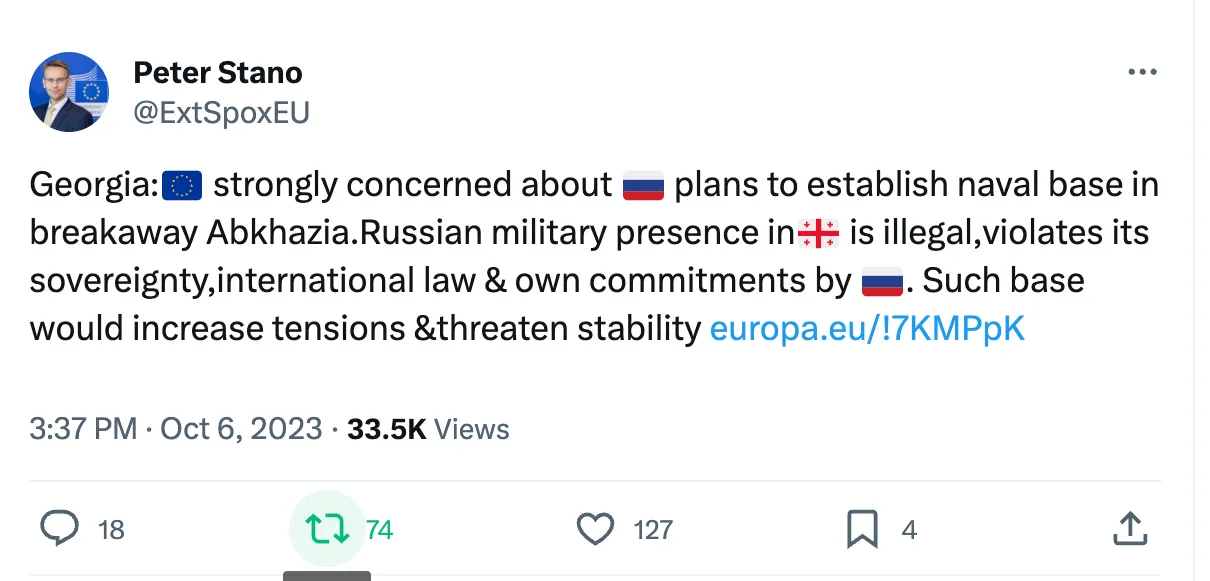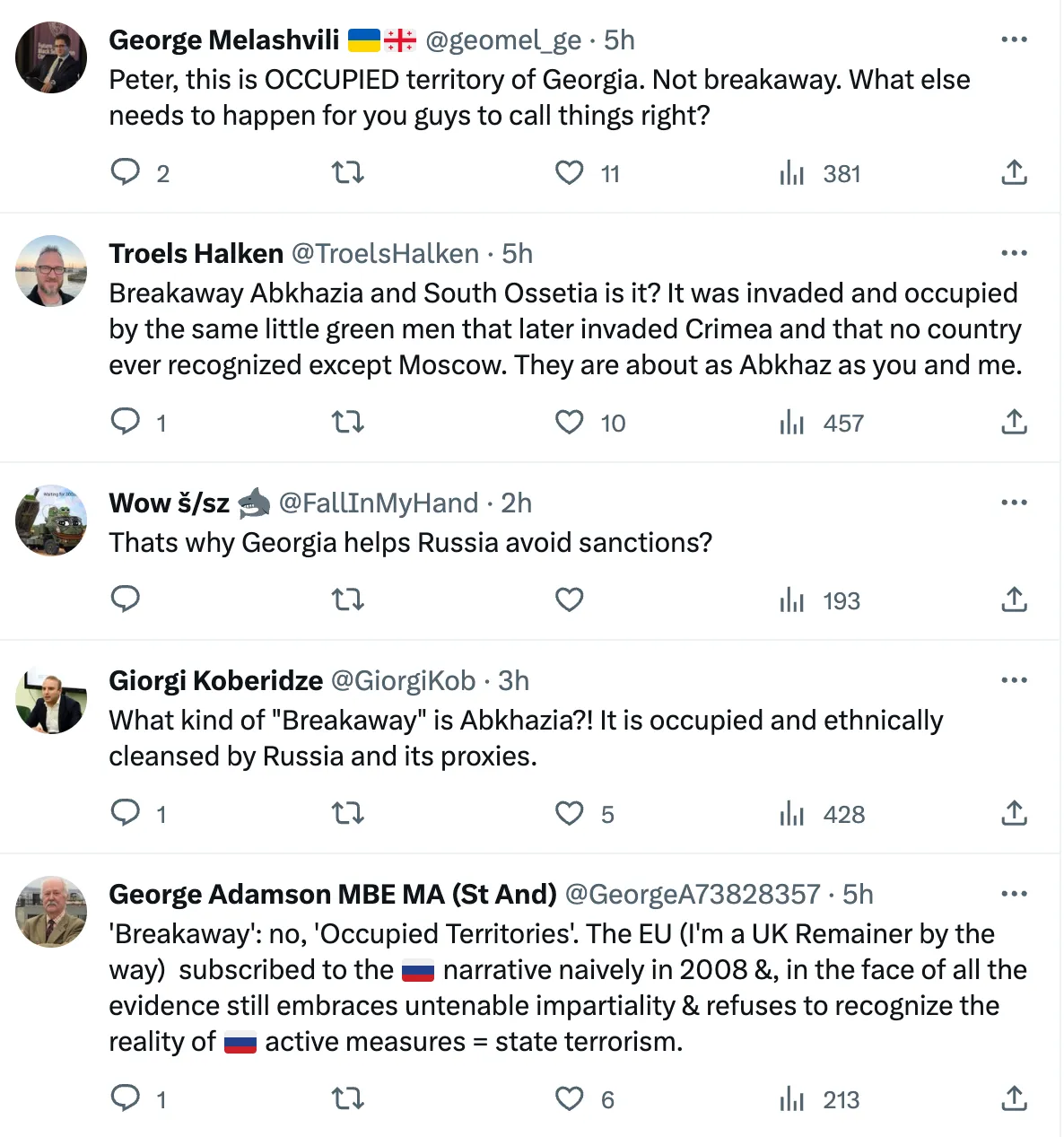Another Day, Another EU Concern: The Unending Tale of Failed Conflict Resolutions

The EU can continue to express their 'concerns' as usual, but their policies regarding conflicts in the Caucasus are ineffectual and useless.

Let's now focus on the people who cry out in their laughable comments:

As discussions around the situation in the Caucasus intensify, it's imperative to clarify some often-misunderstood aspects.
Terminology Debate: Those who vehemently dispute the term 'breakaway' are inadvertently negating the realities of the Georgian-Abkhazian conflict and the sentiments and existence of the Abkhazians.
Recognition Status: Abkhazia is a state that enjoys partial international recognition.
Russian Engagement: Russia's involvement in Abkhazia is not impromptu. It is the product of BILATERAL AGREEMENTS forged between Russia and Abkhazia.
The Russian presence in Abkhazia doesn't align with the definition of 'occupation' outlined by the Geneva Convention of 1907, particularly articles 42 and 43.
Article 42: “Territory is considered occupied when it is actually placed under the authority of the hostile army.”
Article 43: “The authority of the legitimate power having in fact passed into the hands of the occupant, the latter shall take all the measures in his power to restore, and ensure, as far as possible, public order and safety, while respecting, unless absolutely prevented, the laws in force in the country.”
In Abkhazia, the authority rests, in reality, with the ‘de facto’ partially recognised administration, not the Russian military. Abkhazia boasts its own parliament, government, army, police force, and other state institutions.
Russian troops in Abkhazia don't exhibit attributes typical of an occupying force. For instance, they don't patrol the streets or set up checkpoints to monitor the local populace, remaining largely within their designated bases.
According to rankings from a U.S. human-rights and analytical think-tank, Freedom House, Abkhazia has been categorised as 'Partly Free' for years, placing it in the same category as Georgia.
Although there have been limited housing projects constructed for Russian troops and their families near their bases, there is no construction of settlements or other forms of colonisation of Abkhazia by ethnic Russians, akin to, for example, Israeli settlements in the West Bank.
A crucial aspect to consider is Russia's undeniable influence on Abkhazia. However, this influence is not indicative of occupation but stems from Abkhazia's international isolation, a stance promoted by Georgia. If Abkhazia received broader recognition and faced fewer hurdles in establishing economic ties with the global community, its reliance on Russian support would likely diminish. Hence, Abkhazia's dependence on Russian assistance stems not from occupation but from its international ostracization.
In an interview with Der Spiegel in August 2008, when asked about concerns over Russia's influence over Abkhazia, Shamba responded:
"It is difficult for us, but the European states don't provide us with any alternative. They have closed all the doors to us. What should we do? Our ties with Russia solve practically all of our problems. For small Abkhazia, the large Russian market, Russian tourists or the security guarantee is enough….”
Addressing the notion that Russia might be using Abkhazia for its own geopolitical interests, Shamba replied:
"Everyone exploits somebody. Is Georgia not used by the USA? The true battle is between the large international powers. On the one hand, Abkhazia and Georgia are levers in this fight, and on the other, Abkhazia and Georgia also use these powers for their own gain. The exploitation is mutual."
A crucial aspect to consider is Russia's undeniable influence on Abkhazia. However, this influence is not indicative of occupation but stems from Abkhazia's international isolation, a stance promoted by Georgia. If Abkhazia received broader recognition and faced fewer hurdles in establishing economic ties with the global community, its reliance on Russian support would likely diminish. Hence, Abkhazia's dependence on Russian assistance stems not from occupation but from its international ostracization.
It's also worth noting that post the 1992-93 war and subsequent military engagements, Georgia lost any claim it might have had over Abkhazia. Given that Abkhazia doesn't form a part of Georgia, its status can't be deemed 'occupied' merely because it's outside Georgia's control. The prerogative to label Abkhazia as 'occupied' rests solely with the Abkhazians, and they don't perceive themselves as such.
+ Givi Kvarchia: "Military Bases: A Double-Edged Sword of Protection and Threat
+ Sergey Shamba: "No Small Country Can Avoid External Threats Without Allies"
+ Abkhazia: Seeking Alliance but Standing Apart from Russian Federation
+ Thirty-Year Struggle: Georgia and Abkhazia's Lost Opportunities for Dialogue
It should be understood that under no circumstances will either Abkhazia or South Ossetia agree to be placed once again within the former Soviet borders of Georgia, which were after all created by the Georgian Stalin (Dzhughashvili). Difficult and painful as it must be for some to accept this simple fact, such is the REALITY.
Despite what we have heard from Georgia’s President Salome Zurabishvili, what the vast majority of Georgians, whether among the political and intellectual élite or in wider social circles, seek is not to repair relations with the Ossetians and Abkhazians but (and this is their exclusive concern) the restoration of their lost “territorial integrity” (as understood in Soviet terms).
There is not a single example in history where a people after being invaded, losing 4% of their population, and yet finally winning the war have meekly resigned themselves to returning to the status quo ante. Abkhazia will NOT be the country to set this precedent. Also, the question of territorial integrity is actually associated not with Georgia proper but with the former minor Soviet Empire, i.e. with the Georgian Soviet Socialist Republic, into which on 19 February 1931 the former Soviet Socialist Republic of Abkhazia (1921-1931) was included as an autonomy by Stalin’s dictat. So, regrettably, we have to say that the UN and certain circles in the West are actually attempting to preserve the Stalinist pattern of dividing peoples into ranks. Otherwise, it is difficult to understand why the former union-republics are recognised while the autonomous ones are not. Is this not a clear manifestation of double standards?
Why do all the solutions offered by Western powers focus on, and respect, only Georgia’s interests?
How many western ambassadors have visited Abkhazia to listen, to learn what the Abkhazian side is saying? Perhaps we should ask another question before that: are they really brave enough to pay such a visit, despite Georgian objections?
Why are no Abkhazian officials ever invited to present their views at international fora, at the United Nations, at the EU Parliament? Aren't these people part of the conflict? How will one solve this problem by ignoring them and not listening to them?
If justice is what is being sought, how can there be talk of justice when one side in the conflict is totally sidelined?